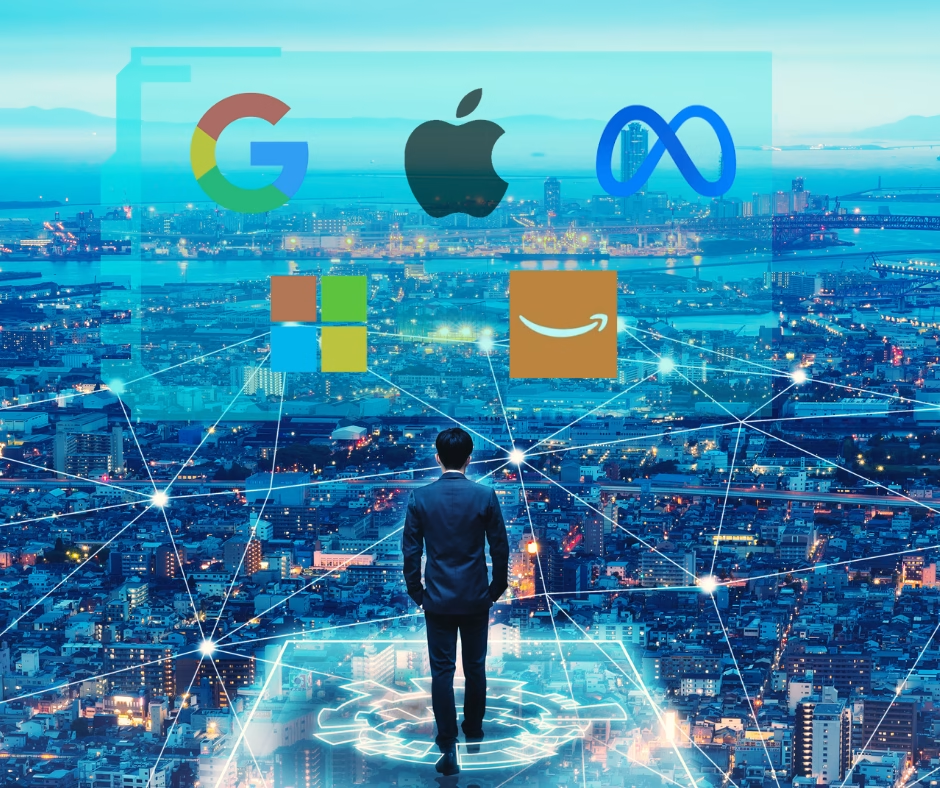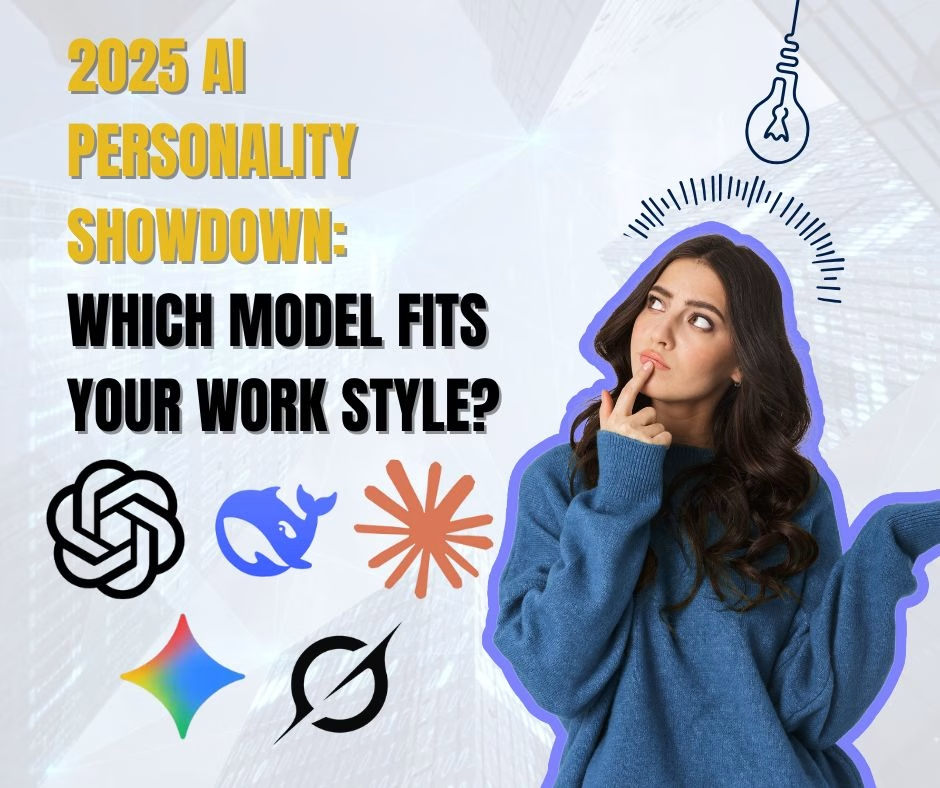
“Another ChatGPT feature? Another AI announcement from Google? Microsoft, Meta, Amazon—everyone’s racing ahead!”
Ever feel like you’re missing out on the next big thing? You’re not alone. From small startups to global enterprises, the question remains: Where is AI heading, and how can we harness it?
As an IT service company, we often hear: “So, what’s really happening with AI?” In short, Big Tech isn’t just using AI—they’re building our future around it. Understanding their strategies can give you an edge, keep you secure, and spark your next big idea—especially if you’re evaluating software licenses, exploring managed IT services, upgrading business computer solutions, or looking into website hosting services with cutting-edge AI.
1. Microsoft: AI as Your Knowledge Co-Pilot
Core Prediction: AI will become every knowledge worker’s personal co-pilot.
Key Approach
- Copilot Everywhere: Integrates GPT-4 into Word, Excel, and more for instant writing, data analysis, and slide design.
- AI Ecosystem: Partners with OpenAI, plus in-house AI chips and Azure AI Studio for quick model training and deployment.
- Enterprise Privacy & Safety: Copilot respects data boundaries; Microsoft invests heavily in Responsible AI Labs.
Why It Matters
Imagine a digital teammate that never sleeps—tackling mundane tasks, generating insights, and freeing you to focus on strategy.
2. Google: AI as the Future of Search and Knowledge
Core Prediction: AI will transform how we find information, learn, and interact online.
Key Approach
- Gemini AI Model: Successor to Bard, supporting text, images, and code with deep multimodal capabilities.
- Search Redesign: AI summaries appear above traditional links, guiding follow-up questions and clarifying complex topics.
- Workspace Integration: Gmail, Docs, and Slides feature AI-driven writing, summaries, and translations.
- Responsible AI: Google emphasizes fairness, safety, and transparency with model cards and clear AI principles.
Why It Matters
Google aims to replace static “search results” with interactive answers, yielding deeper insights, fewer clicks, and more personalized knowledge.
3. Amazon: AI as the Engine of Commerce and the Cloud
Core Prediction: AI will fully automate retail, logistics, and cloud infrastructure.
Key Approach
- AWS as AI Hub: Tools like Bedrock, SageMaker, and Titan provide foundational models and developer resources.
- AI-Driven Retail: From Alexa’s evolving conversational AI to cashierless “Just Walk Out” stores, Amazon optimizes routes, inventory, and personalization.
- In-House Chips: Trainium and Inferentia accelerate model training and reduce reliance on third-party hardware.
Why It Matters
Amazon threads AI into every supply-chain link, delivering faster, cheaper, and more predictive services across retail and cloud solutions.
4. Meta: AI as the Language of Social Connection
Core Prediction: AI will redefine how we interact socially and create digital content.
Key Approach
- Open-Sourcing LLaMA: A free large-language model to build a developer community rivaling OpenAI and Google.
- AI in Messenger & Instagram: Users generate stickers, captions, and images on the fly; celebrity-based personas add new engagement layers.
- Metaverse & XR: AI powers Quest 3 and Ray-Ban smart glasses for scene recognition, translation, and real-time object generation.
- In-House AI Chip: Artemis boosts training and inference, fueling Meta’s immersive ambitions.
Why It Matters
Meta aims to shift social media from passive scrolling to AI-powered creativity, unlocking new forms of communication and entertainment.
5. Apple: The Silent, Personalized AI Experience
Core Prediction: Apple will lead personal AI through subtlety, privacy, and seamless design—no spectacle, just functionality.
Key Approach
- On-Device Intelligence: Apple’s Neural Engine handles tasks like dictation and autocorrect on your iPhone, preserving privacy.
- Siri 2.0: Expected to be more context-aware, while still embodying Apple’s “quietly powerful” approach.
- Health & Wellness: Apple Watch’s machine learning detects subtle health signals, from heart rhythms to mood changes.
- Vision Pro & Spatial Intelligence: Eye tracking and real-world object detection enable intuitive mixed reality experiences.
- Privacy by Design: Private Cloud Compute ensures secure, end-to-end encryption for AI processing.
Why It Matters
While others spotlight AI, Apple integrates it quietly, enhancing user experiences without compromising privacy or simplicity.
Final Takeaway: Five Visions, One AI-Driven Future
Despite stylistic differences, these tech giants share one truth: AI is no longer an add-on—it’s the logic shaping every device and service.
- Microsoft wants AI to be your tireless coworker.
- Google wants AI to be your knowledge guide.
- Amazon wants AI to be your commerce engine.
- Meta wants AI to be your creative partner.
- Apple wants AI to be your invisible helper.
For startups, developers, and businesses, succeeding in this AI race means adopting it wisely. The question isn’t “Will we use AI?”—it’s “How effectively can we integrate AI to solve real-world problems?” Whether you’re exploring software licenses, investing in managed IT services, upgrading business computer solutions, or evaluating website hosting services, these tech giants’ roadmaps can spark insights for thriving in the ever-evolving digital landscape.
FAQ
What is the common attitude of major tech companies toward AI?
While their approaches differ, the core belief is shared: AI is not here to replace humans, but to assist and empower them. It’s a tool to boost productivity, enhance creativity, and improve decision-making — not a substitute for human intelligence.
As a small or medium-sized business owner, which tech company’s AI solutions should I pay attention to?
It depends on your business goals:
- For document automation, productivity, and smarter IT services, explore Microsoft Copilot and its integration with Word, Excel, and Teams.
- For eCommerce, customer service, and scalable infrastructure, Amazon’s AI and AWS tools are ideal — especially if you’re managing logistics or cloud-based platforms.
- For smarter search, content creation, and internal collaboration, Google’s Gemini AI and Workspace integration offer great value — especially when evaluating software licensing or communication tools.
Is it too early to adopt AI right now?
Not at all. Now is the best time to start building your AI foundation. Many companies are already using AI to automate repetitive tasks, enhance customer experience, and gain competitive insights. Early adoption doesn’t mean going all in — it means starting smart, and scaling strategically.




